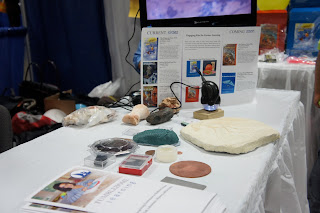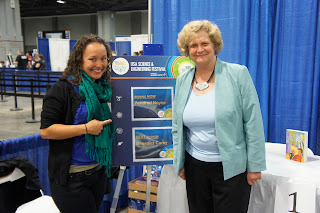Today I'm sharing an interview with Jeffrey Morris, lead author and artist for the new graphic novel Venus: Daedalus One. Jeffrey has a beautifully illustrated online magazine that celebrates science and exploration, and he's currently running a Kickstarter campaign to help finance the creation of his second planetary graphic novel, Mars: Daedalus Two.
 Jeffrey is a gentle person with a real dedication to kids and the future, and his comics are exciting while still managing to stay free of the sexism and violence that mar so much of this art form.
Jeffrey is a gentle person with a real dedication to kids and the future, and his comics are exciting while still managing to stay free of the sexism and violence that mar so much of this art form.
How do you make a graphic novel?
How do you make a graphic novel?
We start with a solid story concept with strong visual potential—which in the case of Venus: Daedalus One was a 110-page feature film script. As an illustrator, I also created a dozens of pencil sketches and marker renderings to get a sense of what the world in our story looked like. Many of these were translated into computer generated images that we could fly around and manipulate. All of the aforementioned media served as the basis for a comic artist to begin building the actual panels and pages. I worked hand in hand with him and colorists to bring the full vision of the script to life in comic form.
We start with a solid story concept with strong visual potential—which in the case of Venus: Daedalus One was a 110-page feature film script. As an illustrator, I also created a dozens of pencil sketches and marker renderings to get a sense of what the world in our story looked like. Many of these were translated into computer generated images that we could fly around and manipulate. All of the aforementioned media served as the basis for a comic artist to begin building the actual panels and pages. I worked hand in hand with him and colorists to bring the full vision of the script to life in comic form.
What's Venus like, and what made you decide to write about it?

I wanted to tell a futuristic story set within our own solar system with a focus on one of the inner planets. Quite a few books and movies have taken place on Mars, while virtually none have occurred on Venus. I think a primary reason is that Venus is a pretty inhospitable place. Searing heat, crushing pressure and scalding acid are the norm. There is no water and little to no chance of life as we know it. I thought it would be fun to throw a group of conflicted characters into a environment that challenging.
Do you think we'll find life on other planets in our solar system?
Absolutely! It is inevitable and just a matter of time. The key question is whether or not human curiosity can outpace waning public interest, partisan politics, and shrinking science budgets. Eventually, we need human minds, eyes, and hands directly on location throughout the Solar System in order to use our innate instincts and intuition to help us uncover the clues that will lead us to life. However, in the meantime, we should continue to launch a barrage of space probes, like NASA's Curiosity, to every possible destination. They are our emissaries for now.
What are you working on next?
I currently am developing Mars: Daedalus Two and several other realistic science fiction stories. Each is part of an ever-expanding world of hard science-fiction titles. My team and I want to establish a niche for ourselves as the purveyors of visually stunning futuristic media that entertains, educates and never underestimates the intelligence of the audience.
Ten years from now, looking back on your work, what do you hope to see?
I hope to have made a real difference in the average person's perception of tomorrow while energizing a base of individuals to work for a better future. I intend to do this by building several successful hard sci-fi franchises that are able to expand into numerous areas or media and entertainment that can truly withstand the test of time. After all, my stories are envisioning and often predicting the future!























